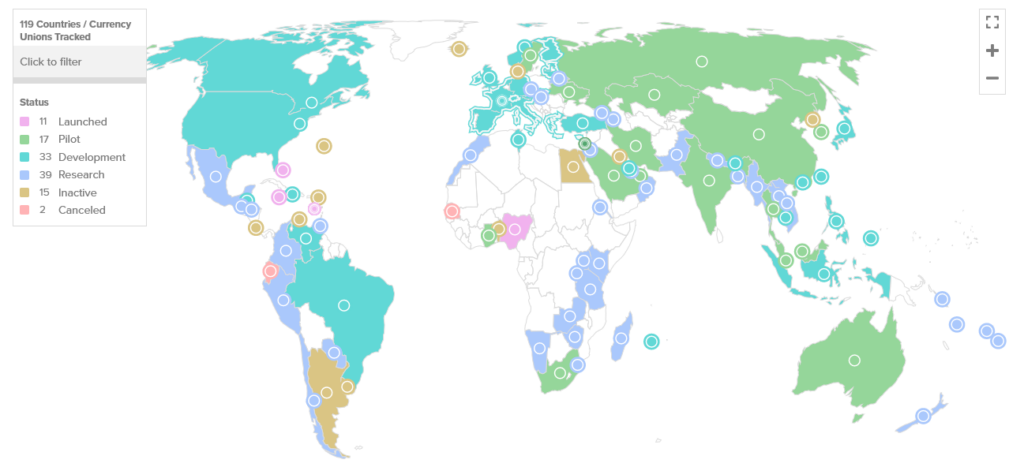Central Bank Digital Currencies (CBDCs) are similar to decentralized cryptocurrencies such as Bitcoin, except they centralize power and influence to a single entity – whose objectives may not match yours or mine.
Recent months have seen an acceleration in CBDC development. In conjunction with numerous political blunders coming to light, including the mishandling of the health crisis, a hostile narrative toward them has emerged.
While CBDC advocates tout benefits such as better financial inclusion and greater efficiency, concerns about their potential threat to personal sovereignty aren’t going away.
A global network of CBDCs is on the way.
According to the Atlantic Council, the majority of countries have either launched or are in the process of launching a Central Bank Digital Currency (CBDC), with African countries standing out as the outliers in this case.


Proponents argue that minimizing the cost of currencies, making cross-border transactions quicker and safer, and tackling the issue of currency counterfeiting are valid reasons to implement CBDCs.
Bank of International Settlements (BIS) General Manager Agustin Carsten echoed this sentiment last year, saying CDBCs can potentially bring about global financial stability while minimizing associated risk.
Furthermore, Carsten eerily implied only central banks have the right to oversee money systems, not “big tech” or private cryptocurrencies.
“the soul of money belongs neither to a big tech nor to an anonymous ledger.”
In recent weeks, all G7 countries have moved into the development stage of their respective CBDC programs. Mexico revised its rollout date to sometime in 2024, and the digital rouble is operating a test pilot – signaling strong momentum toward a global CBDC network.
The problem with CBDCs
Speaking on Fox News recently, investment banker and former U.S. government official Catherine Fitts detailed a scathing account of CBDCs, calling their implementation “the last shutting of the gate.”
Fitts spoke of a general ignorance toward the issue, namely, how many are sleepwalking into a system where our assets become the central banks’ assets – thus rendering citizens extensions of the state.
“we don’t understand that when this gate closes on us, we will literally be sitting in a system where the central banks believe our assets belong to them…”
Under a CBDC system, authorities can potentially control an individual’s spending. Examples include blocking specific purchases or merchants, limiting spending and transfer amounts, and even imposing expiry dates on the money. As such, CBDCs are not currencies; instead, they are a “financial transaction control grid,” Fitts warned.
She concluded that we cannot let propaganda persuade us that CBDCs are convenient or needed.
The digital pound to limit transfers
Although Fitts’ account was largely hypothetical, there are instances found elsewhere that are factual, supporting her points to a significant degree.
On Feb. 4, the Bank of England (BoE) and the U.K. Treasury released their CBDC roadmap and announced a four-month-long consultation to discover public opinion on the digital pound.
According to the Telegraph, the Treasury’s initial plans limit users’ transfers to a few thousand pounds to prevent the possibility of banking collapses resulting from rapid outflows. The Treasury stated that transfer limits encourage adoption while balancing implementation risk. However, it added that “these limits could be amended in the future.”
While the Treasury may lift transfer limits in the future, the initial imposition of a limit does little to inspire confidence among those sick of political shenanigans and doublespeak – more so when commentators like Fitts emphasize the link between CBDCs and financial tyranny.
The digital yuan pilot program marches on
The People’s Bank of China (PBoC) initiated its digital yuan program in 2014. It has since undergone multiple phases of testing and development. In November 2020, the first public test pilot was launched in Shenzhen, followed by an expansion to 10 additional cities in April 2022.
Individuals participate in the program by applying to enter a lottery through China’s four leading banks. Randomly selected winners receive a portion of the allocated funds. In the Shenzhen trial, 50,000 winners received digital “red envelopes” worth 200 yuan ($30) each. The recipients were able to spend the money at local retailers.
By September 2022, the program was extended to provinces, with testing in Guangdong, Hebei, Jiangsu, and Sichuan. More recently, in March 2023, the Fujian province was included in the program.
Social credit system
The CBDC financial tyranny Fitts described is concerning enough on its own. However, when combined with a social credit system, it becomes the stuff of dystopian nightmares.
China’s social credit system was first announced in 2014, coinciding with the launch of the digital yuan research group. The planning document highlighted the importance of administering “comprehensive credit information” and promoting social cohesion to foster greater trust within society.
“is an effective method to strengthen social sincerity, stimulate mutual trust in society, and reducing social contradictions, and is an urgent requirement for strengthening and innovating social governance, and building a Socialist harmonious society.”
The system applies to individuals and businesses and works like credit scores in the West. Points are added and deducted based on wanted and unwanted behavior – as determined by the state. So, for example, the late payment of business taxes would result in a deduction.
Since the social credit score system is still in the pilot phase, a low score’s ultimate consequences are unknown. However, based on reports, punishments have included being blocked from traveling on trains and planes, the children of low-scoring parents being stopped from attending certain universities, informing employers’ hiring decisions, increased likelihood of audits and inspections, and public shaming.
Reports also indicate that there may be regional variations in the scoring, with specific actions resulting in a points deduction in some cities but not others.
There is no logical argument against deterring and punishing severe crimes. But citizens say trivial offenses are also punished, such as jaywalking, walking a dog without a leash, cheating in a video game, and not visiting parents often enough – raising serious questions about political overreach.
Alex Gladstein, the Chief Strategy Officer at the Human Rights Foundation, said an integrated CBDC social credit system sets a frightening paradigm. Concerns are warranted, considering the Communist Party’s history of human rights abuses and lack of transparency.
“When the government can take financial privileges away for posting the wrong word on social media, saying the wrong thing in a call to parents, or sending the wrong photo to relatives, individuals self‐censor and exercise extreme caution. In this way, control over money can create a social chilling effect.”
Skeptics would say social credit systems would never see the light of day elsewhere, especially in the “democratic” West. Yet, in December 2022, the Italian government rolled out a digital ID program in Rome and Bologna to reward “Net Zero” practices. Some argue that digital IDs are a forerunner to a social credit program.
Game over for freedom?
In recent weeks, numerous notable individuals have voiced unease over a coordinated attack on the crypto industry via the banking system, AKA “Operation Chokepoint 2.0,”
Although the program is not directly linked to the push towards CBDCs, former Coinbase CTO Balaji Srinivasan has no doubt the two are related.
In a March tweet, Srinivasan said the upcoming FedNow payment system is the precursor to the American CDBC system – warning that the unprepared will be locked into a digital financial ringfence.
The latest developments saw law firm Cooper and Kirk call on Congress to investigate the “backroom war on crypto.” They argued that recent regulatory actions were unlawful and unconstitutional and intent on hindering the digital asset industry.
They recommended several steps to hold regulators accountable, including reminding agencies that they are subject to the Administrative Procedure Act and must follow due process and probing whether regulators intentionally suppressed private sector innovation.
Fighting back
Chris Blec, decentralization advocate and CEO of the Blec Report, told CryptoSlate that CBDCs are sold on efficiency, convenience, and bettering society. But behind the hopeful message is an attempt “eliminate our financial privacy and micro-manage our lives.”
Nonetheless, Blec said the war is not lost, and it is up to each of us to fight back by:
- Bottom-up action – buying decentralized private cryptocurrencies like Bitcoin.
- Top-down action – using the political system to support anti-CBDC representatives.
“Bottom-up is buying stateless and incorruptible currencies like Bitcoin. Top-down is supporting politicians like Ron DeSantis, who have vowed to use the violent force of government to fight government itself.”
While actioning both approaches may slow CBDC implementation, Blec doubts whether they can be stopped altogether. He said ending CBDCs would require significant societal changes, particularly in political governance and how we treat one another.
Rather bleakly, Blec does not believe society is capable of putting an end to CBDCs. However, he remains optimistic that there will be an opportunity for positive change after society collapses and the current cycle ends.
“I’m not sure if that’s realistic within our current society. However, I’m feeling increasingly optimistic about our NEXT society.”
What now?
It’s difficult to imagine people uniting to oppose CBDCs, or authoritarianism in general, regardless of their differences. However, glimpses of national togetherness are emerging in France, Holland, and other places.
Yet, the reality is that many are still under the spell of disunity over matters of little true importance, while others are afraid to stand up and be counted.
Pain is inevitable, whether through compliance with CBDCs or resistance against them. The choice we each face is whether to endure the pain of submission or resistance.
Ultimately, the future of individual freedoms and privacy is at stake. The question is, what will you do to protect them?
- SEO Powered Content & PR Distribution. Get Amplified Today.
- Platoblockchain. Web3 Metaverse Intelligence. Knowledge Amplified. Access Here.
- Source: https://cryptoslate.com/op-ed-how-to-resist-cbdcs-avert-a-dystopian-future/




